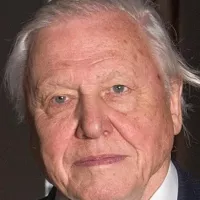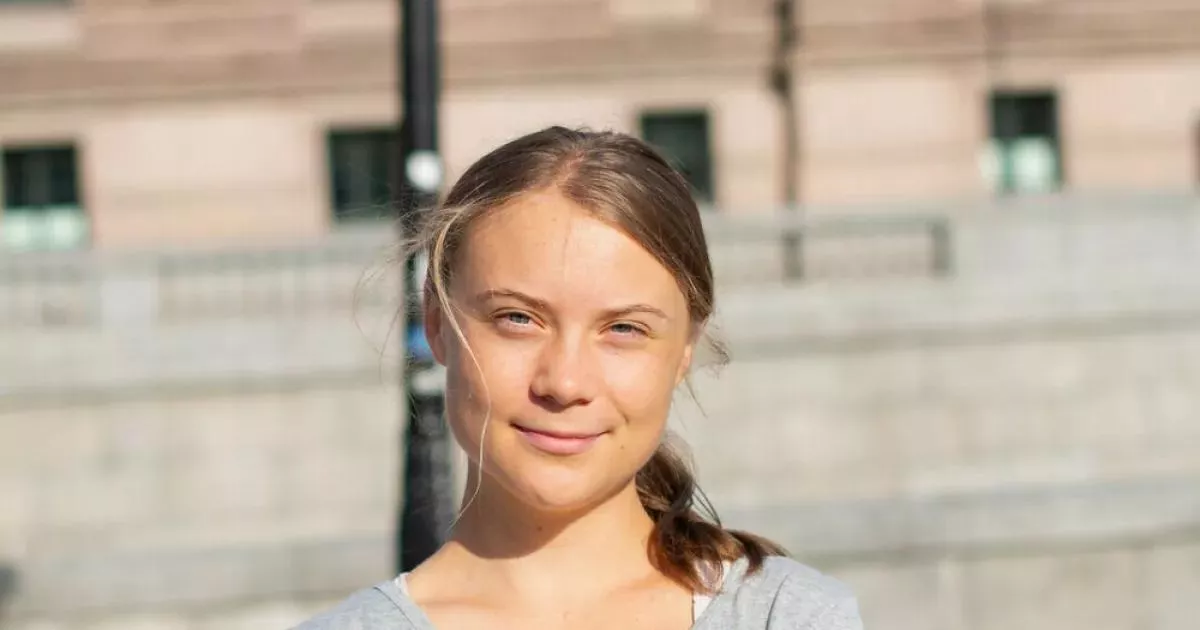Greta Thunberg is a Swedish climate activist who gained international recognition for challenging world leaders to take immediate and decisive action against climate change. Starting with school strikes in 2018, she quickly became a prominent voice in the climate conversation, addressing international forums like the United Nations. Thunberg's activism has inspired a global movement, particularly among young people, advocating for stronger climate policies and increased awareness of environmental issues. While lauded by many, she has also faced criticism and controversy for her direct approach and the perceived alarmist nature of her message. Nevertheless, she remains a significant figure in the fight against climate change.
January 2003: Greta Thunberg Born
In January 2003, Greta Thunberg was born in Sweden. She would later become an international climate activist known for challenging world leaders to take immediate action on climate change.
January 2003: Greta Thunberg Born in Stockholm
In January 2003, Greta Tintin Eleonora Ernman Thunberg was born in Stockholm, Sweden, to opera singer Malena Ernman and actor Svante Thunberg. Her paternal grandfather was actor and director Olof Thunberg.
2008: Politicians acknowledge need to focus on climate change
In 2008, Labour politician Ed Miliband, who was responsible for introducing the Climate Change Act 2008, acknowledged the impact of young people on strike, thanked Greta Thunberg for teaching everyone an important lesson.
2011: Thunberg First Heard About Climate Change
In 2011, at the age of eight, Greta Thunberg first learned about climate change. She became depressed and struggled with her mental health before starting her school strike campaign.
May 2015: Thunberg's Mother Publicly Acknowledged Her Diagnosis
In May 2015, Greta Thunberg's mother publicly disclosed her daughter's Asperger's syndrome diagnosis in Sweden to support other families. Thunberg views her Asperger's as her "superpower."
2015: Greenhouse gas emissions had risen by 4%
Greta Thunberg argued that the global wave of school strikes had "achieved nothing" because greenhouse gas emissions were still rising in December 2019 – by 4% since 2015.
February 2018: School Shootings in the United States
In February 2018, school shootings in the United States led several youths to refuse to return to school, later organizing the March for Our Lives, which inspired Greta Thunberg.
May 2018: Thunberg Won a Climate Change Essay Competition
In May 2018, Greta Thunberg won a climate change essay competition held by Swedish newspaper Svenska Dagbladet.
August 2018: Thunberg Begins School Strikes
In August 2018, 15-year-old Greta Thunberg began skipping school to protest outside the Swedish parliament. She held up a sign reading Skolstrejk för klimatet (School Strike for Climate) to demand stronger climate action, and vowed to strike every Friday until Sweden complied with the Paris Agreement.
August 2018: Start of School Strike
In August 2018, Greta Thunberg started her school strike for climate activism.
2018: Thunberg's Speech at COP24 Went Viral
In 2018, Greta Thunberg's speech during the plenary session of the United Nations Climate Change Conference (COP24) gained widespread attention.
2018: Climate strike protests began
In 2018, after Greta Thunberg's first school strike for the climate, other students engaged in similar protests, uniting and organizing the school strike for climate movement.
2018: IPCC Special Report on Global Warming of 1.5 °C
In 2018, the IPCC's Special Report on Global Warming of 1.5 °C was published, which Greta Thunberg used as a basis for her argument that greenhouse gas emissions needed to decline steeply no later than 2020.
2018: Book Released: Scenes from the Heart
In 2018, the book "Scenes from the Heart" by Greta Thunberg's family was released. It tells the story of how the family lowered their carbon footprint.
2018: Thunberg's Activism Evolves
Throughout 2018, Greta Thunberg's activism evolved from a solitary protest to include demonstrations throughout Europe, high-profile public speeches, and social media mobilization. She began striking from school only on Fridays and inspired students globally.
January 2019: Thunberg Gave Speech at World Economic Forum
In January 2019, Greta Thunberg gave a speech at the World Economic Forum, declaring: "Our house is on fire."
February 2019: Academics show support for Thunberg
In February 2019, Greta Thunberg received support from 224 academics who signed an open letter expressing their inspiration from her actions and the school strikes advocating for climate awareness.
February 2019: Speech to European Economic and Social Committee
In February 2019, at a conference of the European Economic and Social Committee, Greta Thunberg said that the EU's intention to cut emissions by 40% by 2030 is insufficient to protect the future for children and that the EU must reduce their CO2 emissions by 80%.
February 2019: Juncker outlines climate action in EU budget
In February 2019, Greta Thunberg shared a stage with Jean-Claude Juncker, the President of the European Commission, who announced that 25% of the EU budget from 2021 to 2027 would be allocated to climate change mitigation.
March 2019: Thunberg Continued School Strikes
In March 2019, Greta Thunberg continued her regular protests outside the Swedish parliament every Friday, while maintaining excellent grades in school.
April 2019: Speech to British Parliament
In April 2019, Greta Thunberg spoke to the British Parliament, criticizing the lack of action on global emissions and urging politicians to listen to scientists to address the climate crisis.
May 2019: Time Magazine cover featuring Greta Thunberg
In May 2019, Greta Thunberg was featured on the cover of Time magazine, recognized as a role model and one of the "Next Generation Leaders".
May 2019: UN Secretary-General endorses school strikes
In May 2019, United Nations Secretary-General António Guterres endorsed the school strikes initiated by Greta Thunberg, acknowledging the failure of his generation to address climate change adequately and encouraging the youth to take action.
May 2019: Green parties gain seats in European Parliament election
In May 2019, climate issues significantly impacted the European Parliament election, resulting in Green parties achieving their best-ever results and increasing their MEP seat numbers, partly due to the inspiration Greta Thunberg provided to young people.
May 2019: Thunberg addresses criticism online
In May 2019, Greta Thunberg addressed the online criticism she had received, stating that mockery of her appearance or personality indicated the critics lacked valid arguments. Former U.S. Vice President Joe Biden criticized Donald Trump for bullying Thunberg after she was named Time's Person of the Year.
June 2019: Train travel rises in Sweden
In June 2019, Swedish Railways (SJ) reported that the number of Swedes taking the train for domestic journeys had risen by 8% from the previous year, reflecting growing public concern about the impact of flying on CO2 emissions.
June 2019: Public concern about environment soars in Britain
In June 2019, a YouGov poll in Britain revealed that public concern about the environment had reached record levels in the UK, attributed to the influence of Greta Thunberg and Extinction Rebellion.
July 2019: Thunberg Took a Sabbatical Year
In July 2019, Time magazine reported that Greta Thunberg was taking a "sabbatical year" from school to travel in the Americas and attend the 2019 United Nations Climate Change Conference (COP25).
August 2019: Transatlantic Crossing
In August 2019, Greta Thunberg undertook a carbon-neutral transatlantic crossing on the racing yacht Malizia II, equipped with solar panels and underwater turbines. The voyage from Plymouth, England to New York took 15 days, serving as a demonstration of reducing emissions.
August 2019: Thunberg Sailed Across Atlantic Ocean
In August 2019, Greta Thunberg sailed across the Atlantic Ocean from Plymouth, England, to New York City on the Malizia II yacht to attend the UN Climate Action Summit.
August 2019: Personal attacks and criticism against Thunberg
In August 2019, it was reported that Greta Thunberg's detractors launched personal attacks, including attacks on her autism, to undermine her influence. Columnists and media outlets were also criticized for making "ugly personal attacks" against her.
August 2019: Children's books about climate crisis sales double
In August 2019, the publication and sales of children's books about the climate crisis reportedly doubled compared to the previous year. Publishers attributed this increase to the "Greta effect".
September 2019: Attended UN Climate Action Summit and UNICEF press conference
In September 2019, Greta Thunberg attended the UN Climate Action Summit in New York City and joined a UNICEF press conference alongside 15 other children, including Ayakha Melithafa, Alexandria Villaseñor, Catarina Lorenzo, Ridhima Pandey and Carl Smith.
September 2019: Led climate rally as part of Global Climate Strike in Montreal
In September 2019, Greta Thunberg led a climate rally as part of the Global Climate Strike in Montreal. Over four million people attended the school strikes for climate on 20 and 27 September. Hundreds of thousands took part in the Montreal protest. The mayor of Montreal gave her the Freedom of the City award.
September 2019: Support from US Democratic candidates
In September 2019, Democratic candidates for the 2020 United States presidential election, including Kamala Harris, Beto O'Rourke, and Bernie Sanders, voiced their support for Greta Thunberg following her speech at the action summit in New York.
September 2019: Trump mocks Thunberg on Twitter
In September 2019, Donald Trump shared a video of Greta Thunberg addressing world leaders with a quote about mass extinction. Trump mocked her, tweeting about her seeming like "a very happy young girl." Thunberg responded by changing her Twitter bio to match his description.
September 2019: Thunberg attends UN Climate Summit in New York City
In September 2019, Greta Thunberg attended the United Nations Climate Summit in New York City, after a two-week sea voyage across the Atlantic Ocean.
September 2019: British Vogue cover featuring Greta Thunberg
In September 2019, Greta Thunberg was featured on the cover of British Vogue, created by guest editor Meghan, Duchess of Sussex, along with fifteen others.
September 2019: Greta Thunberg's UN speech set to death metal
In September 2019, John Meredith set Greta Thunberg's UN Action Summit speech to death metal music.
September 2019: Gillespie criticizes Thunberg's histrionics
In September 2019, Nick Gillespie wrote in Reason that Greta Thunberg's histrionics were heartfelt but neither they nor the responses they conjured were a guide forward to good environmental policy.
September 2019: Participated in climate protests in Canada
In late September 2019, Greta Thunberg participated in climate protests in Montreal, Edmonton, and Vancouver, Canada, which included leading a climate rally as part of the Global Climate Strike in Montreal on 27 September. The mayor of Montreal gave her the Freedom of the City award. Prime Minister Justin Trudeau was in attendance, and Thunberg spoke briefly with him.
October 2019: Putin describes Thunberg as "kind girl" but criticizes her
In October 2019, Vladimir Putin described Greta Thunberg as a "kind girl and very sincere" but suggested she was being manipulated. He criticized her as "poorly informed", claiming she didn't understand the complexity of the modern world and the aspirations of people in Africa and Asia.
November 2019: Sailed across the Atlantic Ocean to attend COP25
In November 2019, Greta Thunberg, refusing to fly due to carbon emissions, set sail from Hampton, Virginia, to Lisbon, Portugal, aboard the catamaran La Vagabonde, offered by Riley Whitelum and Elayna Carausu, to attend the COP25 in Madrid after it was moved from Santiago, Chile. Her message was to unite behind the science and act on the science.
November 2019: Atwood calls Thunberg 'Joan of Arc of the environment'
In November 2019, Margaret Atwood referred to Greta Thunberg as "the Joan of Arc of the environment".
December 2019: Arrived in Lisbon and spoke at COP25
In December 2019, Greta Thunberg arrived in the Port of Lisbon and traveled to Madrid to speak at COP25 and participate in the local Fridays for Future climate strikes. During a press conference before the march, she called for more "concrete action", arguing that the global wave of school strikes over the previous year had "achieved nothing" because greenhouse gas emissions were still rising – by 4% since 2015.
December 2019: Madrid Speech on Climate Change Impact
In December 2019, Greta Thunberg spoke in Madrid about the disproportionate effect of climate change on young people and those in the Global South, emphasizing the lack of action on their behalf.
December 2019: Thunberg responds to Bolsonaro's "brat" comment
In December 2019, Greta Thunberg tweeted about the murders of indigenous people protecting forests. In response, then Brazilian president Jair Bolsonaro called her a "brat". Thunberg then changed her Twitter description to 'pirralha', the Portuguese word for 'brat' used by Bolsonaro.
December 2019: Thunberg's Father Discussed Family's Lifestyle Changes
In December 2019, Greta Thunberg's father explained to the BBC that her mother's decision to give up flying was primarily to support Greta, rather than solely to save the climate, and noted Greta's subsequent growth.
December 2019: Trump mocks Thunberg after she is named Time's Person of the Year
In December 2019, after Time named Greta Thunberg as Person of the Year for 2019, Donald Trump again mocked her on Twitter, suggesting she work on her "Anger Management problem." Thunberg responded by updating her Twitter biography to reflect Trump's comments.
December 2019: New Scientist: world wakes up to climate change
In December 2019, the New Scientist published the headline, "The year the world woke up to climate change", describing the impact made by Greta Thunberg and Extinction Rebellion.
2019: Collaboration with Project Pressure
In 2019, Greta Thunberg collaborated with the climate charity Project Pressure on an art piece projected onto the United Nations Secretariat Building in New York.
2019: Thunberg comments on politicians' climate actions
In 2019, Greta Thunberg commented on politicians' climate actions stating that she has not been impressed by any politician, including New Zealand Prime Minister Jacinda Ardern. She said that emissions haven't fallen, indicating these people are not doing enough.
2019: Thunberg addressed the UN Climate Action Summit
In 2019, Greta Thunberg sailed from England to New York to address the UN Climate Action Summit. She rebuked world leaders with the phrase "How dare you" in reference to their perceived inaction on the climate crisis.
2019: Thunberg promotes rail travel over flying
In 2019, Greta Thunberg spearheaded the anti-flying movement, promoting rail travel over flying due to environmental concerns, supporting the "flight shame" movement.
2019: Thunberg Recieved Honors and Awards
In 2019, Greta Thunberg's influence earned her honors such as being named Time's youngest Person of the Year and inclusion in Forbes' list of The World's 100 Most Powerful Women. She also received nominations for the Nobel Peace Prize.
2019: Guest editor of BBC Radio's Today Programme
In late 2019, Greta Thunberg was the guest editor of BBC Radio's Today Programme, featuring interviews on climate change with figures like Sir David Attenborough, Mark Carney, Robert Del Naja, and Maarten Wetselaar. The interviews were released as a podcast.
January 2020: Returned to the World Economic Forum in Davos
In January 2020, Greta Thunberg returned to the World Economic Forum in Davos, Switzerland, delivering two speeches and participating in panel discussions. She focused on the theme: "Our house is still on fire."
February 2020: X-Site Energy Services sticker controversy
In February 2020, X-Site Energy Services of Alberta, Canada, distributed a sticker with a degrading image of a girl labeled "Greta", leading to public outrage. Thunberg responded on Twitter, and X-Site Energy later apologized, destroyed the stickers, and made organizational changes.
March 2020: Moved activities online due to COVID-19 pandemic
In March 2020, Greta Thunberg and School Strike for Climate moved their activities online due to the COVID-19 pandemic. Thunberg stated: "In a crisis we change our behavior and adapt to the new circumstances for the greater good of society."
May 2020: Greta Thunberg featured in Pearl Jam's "Retrograde" music video
In May 2020, Greta Thunberg was featured in Pearl Jam's music video "Retrograde". She appears as a fortune teller, with images in her crystal ball depicting climate change effects.
July 2020: Open letter to EU leaders to make ecocide an international crime
In July 2020, Greta Thunberg, along with Luisa Neubauer, Anuna De Wever, and Adélaïde Charlier, co-authored an open letter addressed to all EU leaders and heads of state, urging them to champion the recognition of ecocide as an international crime at the International Criminal Court.
August 2020: Ended gap year
Greta Thunberg ended her gap year in August 2020. Travel over the next year was restricted because of the COVID-19 pandemic.
August 2020: Met with Angela Merkel
On 20 August 2020, the second anniversary of Thunberg's first strike, Greta Thunberg and fellow climate activists met with German Chancellor Angela Merkel in Berlin. They subsequently announced plans for another global climate strike on 25 September 2020.
September 2020: Announced plans for another global climate strike
In September 2020, Greta Thunberg and fellow climate activists announced plans for another global climate strike on 25 September, the nature of which would be determined by the COVID-19 pandemic situation.
September 2020: Premiere of "I Am Greta" documentary at Venice Film Festival
On 3 September 2020, the documentary I Am Greta, directed by Nathan Grossman, premiered at the Venice Film Festival.
November 2020: Criticism of Political Inaction and European Green Deal
In a November 2020 interview, Greta Thunberg criticized political inaction and the European Green Deal, stating that leaders set targets for decades ahead but flinch when immediate action is needed, and that the Green Deal sends a false signal of real action.
December 2020: Criticized New Zealand Labour Government's climate change declaration
On 14 December 2020, Greta Thunberg criticized the New Zealand Labour Government's climate change emergency declaration as "virtue signalling". On 29 December 2020, during a BBC interview, Thunberg said that climate experts are not being listened to despite the COVID-19 pandemic.
2020: Thunberg references Trump tweet during US election
During the 2020 United States presidential election, Greta Thunberg referenced Donald Trump's tweet "Stop the count!" by tweeting about Trump's need to work on his "Anger Management problem," mirroring Trump's earlier mockery of her.
2020: Call for urgent action on climate change
Greta Thunberg stated that greenhouse gas emissions curve needs to start declining steeply no later than 2020, as detailed in the IPCC's Special Report on Global Warming of 1.5 °C.
2020: Merkel acknowledges Thunberg's influence
In 2020, German Chancellor Angela Merkel acknowledged that young activists such as Greta Thunberg had motivated her government to accelerate actions against climate change.
2020: Thunberg spoke out against India's Entrance Exams
In 2020, Greta Thunberg voiced her opposition to the National Eligibility cum Entrance Test (Undergraduate) and Joint Entrance Examination entrance exams in India due to the pandemic and floods.
2020: Indian farmers' protest
In 2020, Thunberg tweeted her support of the Indian farmers' protest.
February 2021: Thunberg Supported Indian Farmers' Protest
In February 2021, Greta Thunberg tweeted in support of the Indian farmers' protest, leading to criticism and the arrest of an Indian climate activist.
March 2021: University of Winchester installs Greta Thunberg sculpture
In March 2021, the University of Winchester installed a life-sized sculpture of Greta Thunberg on its campus.
March 2021: Timmermans commits to European Green Deal after talking to Thunberg
On March 30, 2021, European Commissioner for Climate Action Frans Timmermans tweeted that the Commission remains committed to making the Common Agricultural Policy fulfill the objectives of the European Green Deal after talking to Greta Thunberg.
April 2021: Launched the annual Climate Live concert
In April 2021, Greta Thunberg and other climate activists launched the annual Climate Live concert to highlight climate change.
May 2021: Addressed the COVID-19 crisis
In May 2021, Greta Thunberg addressed the COVID-19 crisis again, urging a change in the food production system and the protection of animals and their habitats. Thunberg said that the way humans are destroying habitats are the perfect conditions for the spread of diseases and noted zoonotic illnesses such as COVID-19, Zika, Ebola, West Nile fever, SARS, MERS, among others.
July 2021: Received her COVID vaccine
In July 2021, Greta Thunberg received her COVID vaccine, urging others to get vaccinated when offered the opportunity, emphasizing the unequal distribution of vaccines worldwide.
August 2021: Thunberg targeted by disinformation and conspiracies
In August 2021, Yasmeen Serhan wrote in The Atlantic that Greta Thunberg had become "the target of a barrage of disinformation and conspiracies" from the far-right and populist right, including depictions of her as a spoiled child, a leftist pawn, and even a Nazi.
September 2021: Thunberg Discussed Impact on Mother's Career
In September 2021, Greta Thunberg addressed concerns about ending her mother's international opera career, clarifying it was her mother's choice based on provided information.
September 2021: Featured on cover of Vogue Scandinavia and criticized the fashion industry
In September 2021, Greta Thunberg was featured on the cover of Vogue Scandinavia. In the interview, Thunberg criticized the promotional campaigns the fashion industry uses to appear sustainable without "actually doing anything to protect the environment" and called the campaigns "greenwashing".
September 2021: Criticized world leaders at Youth4Climate Summit
On 28 September 2021, Greta Thunberg criticized U.S. president Joe Biden, British prime minister Boris Johnson, Indian prime minister Narendra Modi, and other world leaders over their promises to address the climate crisis in a speech at the Youth4Climate Summit in Milan. Thunberg also criticized and doubted organizers of climate conferences, saying, "They invite cherry-picked young people to meetings like this to pretend they are listening to us. But they are not."
October 2021: Thunberg attends COP26 in Glasgow and protests
On October 30, 2021, Greta Thunberg arrived at Glasgow Central station for the COP26. She participated in protests, including a Fridays for Future Scotland climate strike on November 5, and delivered a speech denouncing COP26 as a failure, using terms like "blah blah blah" and "greenwashing".
November 2021: Filed a petition to the United Nations
In November 2021, Greta Thunberg, along with other climate activists, filed a petition to the United Nations, calling it to declare a level 3 global climate emergency.
December 2021: Reiterated her criticism of U.S. president Joe Biden
In December 2021, Greta Thunberg reiterated her criticism of U.S. president Joe Biden, alluding to the United States expansions on use of fossil fuels during the Biden administration. Thunberg further lamented that activists and teenagers are needed to bring awareness about climate change.
2021: Study links familiarity with Thunberg to climate action
According to a 2021 study, there is a correlation between familiarity with Greta Thunberg and intentions to take collective actions to reduce global warming. The study also suggests that stronger collective efficacy beliefs mediate this relationship, even when accounting for respondents' overall support for climate activism.
2021: Thunberg Spoke About Autism and Climate Activism
In 2021, Greta Thunberg discussed the prevalence of autism within the Fridays for Future movement, highlighting the inclusive environment and the connection between autistic individuals' perspectives and climate activism.
2021: Thunberg criticizes COP26 and calls out Xi Jinping
In 2021, prior to the United Nations Climate Change Conference (COP26) in Glasgow, Greta Thunberg expressed skepticism about the conference's potential for meaningful change. She criticized Chinese president Xi Jinping, labeling him "a leader of a dictatorship" and highlighting the need for democracy to address the climate crisis, emphasizing the power of public pressure.
2021: Juncker outlines climate action in EU budget
In February 2019, Jean-Claude Juncker, the President of the European Commission, announced that in the next financial period starting from 2021, 25% of the EU budget until 2027 would be allocated to climate change mitigation.
2022: Criticized the European Parliament for labeling fossil gas and nuclear energy as "green" energy
In 2022, Greta Thunberg criticized the European Parliament for voting to label fossil gas and nuclear energy as "green" energy, calling it "hypocrisy".
2022: Opposed invasion of Ukraine
In 2022, following the invasion of Ukraine by Russian military forces, Greta Thunberg combined her usual Friday climate protests to include opposing the invasion. She stood outside the Russian embassy in Stockholm holding a sign that read "Stand With Ukraine".
2022: Released The Climate Book
In late 2022, Greta Thunberg released The Climate Book, a compilation of essays from over one hundred experts. She donated her copyright and royalties to her foundation.
January 2023: Protest and Detention in Lützerath
In January 2023, Greta Thunberg participated in a protest in Lützerath against the expansion of a coal mine and was detained by German police on January 17th, along with other activists, for demonstrating near the Garzweiler 2 opencast coal mine. She was released the same day after an identity check.
June 2023: High School Graduation and Final School Strike
In June 2023, Greta Thunberg graduated from high school and marked the day with her last school strike for climate protest before receiving her diploma. She wore traditional Swedish graduation attire and vowed to continue her fight.
June 2023: Met with Ukrainian President Volodymyr Zelenskyy
In June 2023, Greta Thunberg met with Ukrainian President Volodymyr Zelenskyy and other prominent European figures to form a working group to address ecological damage from the 16-month-old Russian invasion.
June 2023: Reclaim the Future Protest and Trial
In June 2023, Greta Thunberg participated in a Reclaim the Future protest in Malmö, Sweden, and was charged with disobeying a police order. She was later found guilty and sentenced to pay fines, but attended another protest immediately after the court decision and was again charged.
October 2023: Climate Protest and Controversy over Gaza
In October 2023, Greta Thunberg's post supporting Palestinians in Gaza during her climate protest drew immediate criticism for not condemning the October 7 attacks. The Israeli Ministry of Education responded by removing references to her as a role model from the curriculum.
December 2023: Opinion Piece on Gaza in The Guardian
In December 2023, Greta Thunberg and Fridays for Future Sweden published an opinion piece in The Guardian, titled "We won't stop speaking out about Gaza's suffering – there is no climate justice without human rights," expressing support for Palestinian civilians in Gaza and defending their political stance. They stated that the Fridays for Future groups are autonomous.
2023: Thunberg graduated from High School
In 2023, Greta Thunberg graduated from high school and continued her activism with increasingly assertive tactics, including acts of civil disobedience.
April 2024: Extinction Rebellion Protest in The Hague
In April 2024, Greta Thunberg participated in an Extinction Rebellion protest in The Hague and was forcibly removed from blocking a road by law enforcement. She later joined another protest, was removed again, and faced potential civil disobedience charges. A Swedish court convicted her and she was fined.
2024: Boycott of COP29 and Visit to Georgia and Armenia
In 2024, Greta Thunberg boycotted COP29 due to human rights violations in Azerbaijan and visited Georgia and Armenia. In Georgia, she joined a political demonstration against the government, supporting activists defending fundamental rights.
2024: Pro-Palestinian protests, Detentions and Controversies
In 2024, Greta Thunberg was detained by Swedish police for participating in a pro-Palestinian protest during the Eurovision Song Contest, apprehended during a similar protest in Copenhagen, and removed from Stockholm University library for protesting. She was subsequently labeled "antisemite of the week" by StopAntisemitism and faced criticism for her statements on Germany and Israel.
May 2025: Cancelled Gaza Freedom Flotilla Plans
In May 2025, Greta Thunberg's plans to join the Gaza Freedom Flotilla were cancelled after one of the vessels was attacked by drones in international waters, which was intended to deliver humanitarian aid to Gaza amidst the blockade.
June 2025: Budapest Pride Protest
In June 2025, Greta Thunberg participated in the Budapest Pride to protest its ban by the Hungarian parliament.
June 2025: Freedom Flotilla Coalition Aid Mission to Gaza
In June 2025, the Freedom Flotilla Coalition launched a new aid mission to Gaza aboard the UK-flagged vessel Madleen, aiming to challenge Israel's naval blockade and deliver humanitarian supplies, amidst renewed global scrutiny of Israel's blockade.
July 2025: Joining the Global Sumud Flotilla
In July 2025, following the capture of another aid flotilla, Greta Thunberg joined the Global Sumud Flotilla, the largest civilian effort to break the siege of Gaza. She is part of the steering committee.
July 2025: Protest Against Hydroelectric Plant in North Macedonia
On July 26, 2025, Greta Thunberg joined protests in North Macedonia against the construction of a hydroelectric power plant on the Došnica River on the Kožuf Mountain.
September 2025: Global Sumud Flotilla set sail
In September 2025, the Global Sumud Flotilla, with Greta Thunberg as part of the steering committee, set sail to break the siege of Gaza.
2025: Criticized carbon emission reduction target by the Labour government
In December 2020, Greta Thunberg criticized the New Zealand Labour Government saying that they had only committed to reducing less than one percent of New Zealand's carbon emissions by 2025.
2027: Juncker outlines climate action in EU budget
In February 2019, Jean-Claude Juncker, the President of the European Commission, announced that in the next financial period from 2021 to 2027, 25% of the EU budget would be allocated to climate change mitigation.
2030: Call for urgent action on climate change
Greta Thunberg said that the EU's current intention to cut emissions by 40% by 2030 is insufficient to protect the future for children and that the EU must reduce their CO2 emissions by 80%.
2035: Airbus and Boeing expect continued growth in air travel until 2035
In 2019, Sweden reported a 4% drop in domestic air travel and an increase in rail use. The BBC says that the movement could halve the growth of global air travel, but Airbus and Boeing say that they still expect to grow at around 4% until 2035.
2050: Criticism of Political Inaction and European Green Deal
In a November 2020 interview, Greta Thunberg criticized political inaction and the European Green Deal, which aims to make the European Union carbon neutral by 2050, stating that it sends a false signal of real action.
Mentioned in this timeline

Donald John Trump is an American politician media personality and...

Bernie Sanders is a prominent American politician currently serving as...

Malala Yousafzai is a Pakistani activist advocating for female education...

Sir David Attenborough is a highly influential British broadcaster biologist...
Ukraine is a country in Eastern Europe the second-largest on...

Kamala Harris is an American politician and attorney She served...
Trending

48 minutes ago Cameron Boozer: Duke Forward, Elite Numbers, and Wooden Award Favorite

48 minutes ago Josiah Harrell's Sensational UFC Debut After Rare Brain Disease Diagnosis: A Houston Story

49 minutes ago Rajah Caruth shines at JR Motorsports; Mayer takes pole; Mears avoids crash.

49 minutes ago Anthony Black scores 20 points in Magic's Thursday's victory, Desmond Bane contributes.

49 minutes ago Yaxel Lendeborg's life story, Michigan rise, and draft prospects are revealed.
2 hours ago Alabama Basketball Faces LSU: A Crucial Road Matchup and Maturity Test Looms
Popular

Jesse Jackson is an American civil rights activist politician and...

Barack Obama the th U S President - was the...

Ken Paxton is an American politician and lawyer serving as...

Bernie Sanders is a prominent American politician currently serving as...
Randall Adam Fine is an American politician a Republican who...

Michael Joseph Jackson the King of Pop was a highly...


